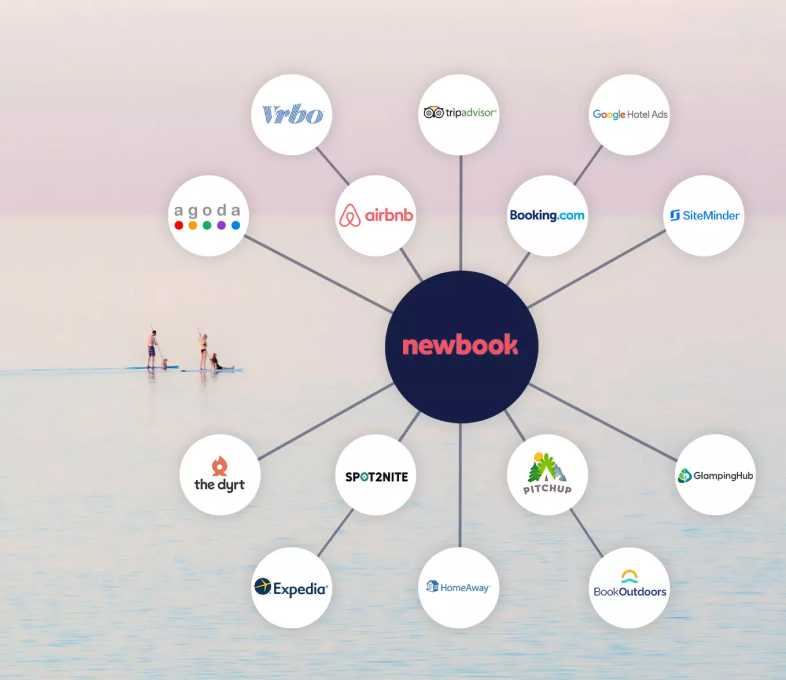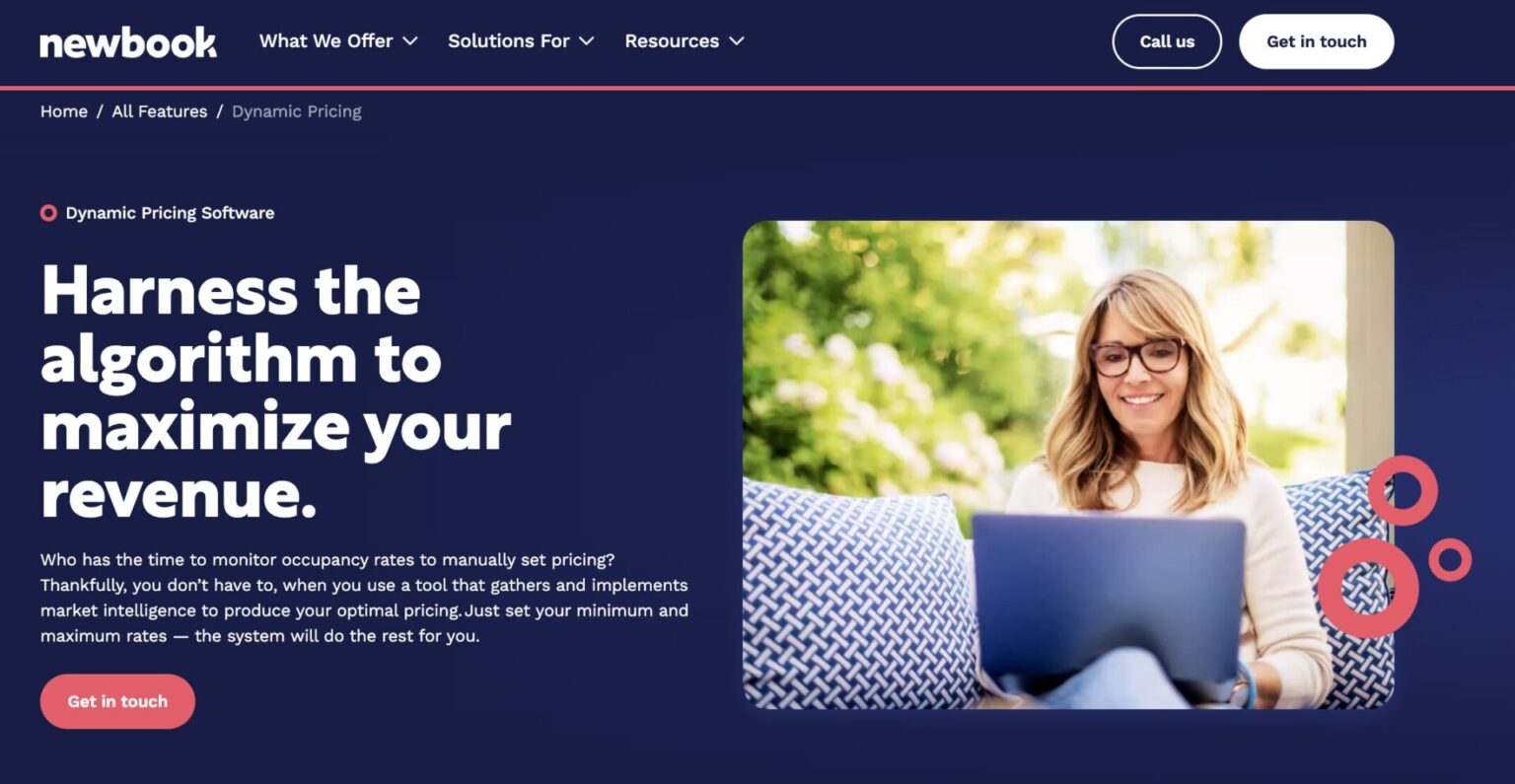At any hospitality business, the revenue manager’s role is partly to manage sales data from all revenue generating sources, including room rentals, but also restaurants, attractions, equipment and facility rentals (e.g., renting a canoe or ballroom space for a conference) to determine where money is coming in and identify areas of improvement. They also need to stay informed about the local hospitality market, as well as anything that could potentially affect revenue generation, like weather, travel conditions, and political and economic factors. Other information, like patterns and trends regarding guest behavior and purchase history are useful as well.
Given the vast amount of information that a revenue manager has to parse through, it makes sense to incorporate a vacation rental revenue management system rather than relying on piecemealing data together from various sources manually and trying to glean insights from it that way (we’re looking at you, Excel).
Combining accurate historical and up-to-date data in a vacation rental revenue management tool provides a plethora of benefits that work to maximize revenue. In this article, we explore those benefits and provide insight into how you can get the most out of your software.
Understanding Vacation Rental Revenue Management Systems
Effective revenue management is critical for property managers seeking to maximize profitability while at the same time streamlining operations. A vacation rental revenue management system (RMS) serves as an essential tool to optimize pricing, occupancy, and overall revenue. This software is designed to simplify the complexities of hospitality finance, helping property managers stay ahead in an ever-evolving industry.
Why Property Managers Need Vacation Rental Revenue Management Software
While organizing and keeping track of finances is an important part of a vacation rental revenue management system, it also gives hospitality managers the opportunity to increase the property’s bottom line while saving valuable time. Traditionally, revenue management for hospitality involved looking at historical data pretty much exclusively to do things like set accurate prices for accommodations and better understand the landscape of the hospitality industry in the area where the property is located. While observing historical data is still relevant and will continue to be, modern vacation rental revenue management systems allow managers to go a step further by incorporating real-time data through built-in system functionality, through integrations, or both. For example, a tool like AirDNA could be integrated with a vacation rental revenue management tool like Newbook to provide foundational data to optimize pricing strategies.
With that in mind, here are some important benefits of vacation rental revenue management software:
1. Dynamic Pricing Optimization
The hospitality market is highly dynamic, with demand influenced by factors like seasonality, local events, market trends, and competitor pricing. A vacation rental revenue management system combines historical and real-time data and analytics to adjust pricing dynamically, ensuring properties remain competitively priced without leaving money on the table.
Here’s an example of dynamic pricing in action:
During July, the coastal town becomes a prime vacation spot, with festivals, warm weather, and school holidays driving demand. The RMS identifies high booking activity on platforms like Booking.com and Airbnb and notes that competitor hotels are nearing full occupancy.
- Dynamic Pricing Adjustment:
The system raises room rates by 40%, reflecting the increased willingness of travelers to pay a premium during peak season. The RMS also analyzes patterns to suggest tiered pricing, offering ocean-view rooms at a higher premium compared to standard rooms. - Outcome:
The hotel capitalizes on the high demand, maximizing revenue per room while maintaining competitive pricing relative to similar properties in the area.
2. Improved Occupancy Rates
RMS tools analyze historical booking data, current trends, and demand forecasts to recommend pricing that maximizes occupancy. By filling gaps in bookings, property managers can enhance revenue streams while maintaining operational efficiency.
3. Time Efficiency
Manually monitoring market trends, setting prices, and managing inventory across multiple platforms can be time-consuming. Revenue management software automates these tasks, freeing property managers to focus on customer service and property improvements.
4. Revenue Forecasting and Budgeting
With built-in forecasting tools, RMS allows property managers to predict future revenue based on current market conditions and historical data. This helps in setting realistic financial goals and making informed investment decisions.
5. Multi-Channel Integration
Vacation rentals often rely on multiple platforms like Airbnb, Booking.com, and VRBO to advertise their business and secure bookings. Revenue management systems integrate with channel platforms to centralize data and synchronize pricing, ensuring consistency and reducing the risk of overbookings or pricing discrepancies. Plus, with Newbook’s property management side of the software, you can also manage your listings centrally and make singular changes to images, descriptions, and more on one listing, and have those changes update on all of your listings without you having to visit each individual website.
More bookings, more often with our built in channel manager
Newbook is your all in one property management software. Talk to us today to learn how you can inprove operations and increase bookings for your business.


6. Enhanced Data-Driven Decisions
RMS provides actionable insights through robust analytics dashboards, helping property managers make data-driven decisions. Understanding guest behavior, booking patterns, and market trends leads to better strategies for maximizing revenue.
Challenges a Vacation Rental Revenue Manager Faces
Managing revenue for vacation rentals comes with unique challenges due to fluctuating demand, diverse booking channels, and the need for precise pricing strategies. Vacation rental revenue management software addresses these challenges with data-driven tools and automation, allowing property managers to maximize revenue while maintaining operational efficiency.
Challenge 1: Pricing Complexity Across Properties
- Challenge: Vacation rental portfolios often include a variety of properties, each with different sizes, locations, and amenities. Pricing each property accurately while accounting for their unique attributes can be overwhelming.
- Solution with Vacation Rental Revenue Management: The software enables property managers to customize pricing for individual properties while factoring in location, size, amenities, and competitor pricing. Advanced algorithms ensure each property has the most competitive rates to maximize bookings and revenue.
Challenge 2: Competitor Monitoring
- Challenge: Monitoring competitor rates manually across multiple booking platforms is time-consuming and prone to errors. Missing out on market shifts can result in prices that are too high or too low.
- Solution with Vacation Rental Revenue Management: Provides real-time competitor analysis, tracking pricing trends for similar properties in the area. The software automatically adjusts your rates to stay competitive, ensuring you capture market share without undervaluing your properties.
Challenge 3: Data Overload
- Challenge: Revenue managers must analyze vast amounts of data, from booking patterns to local market trends, which can be overwhelming without the right tools.
- Solution with Vacation Rental Revenue Management: The software consolidates and visualizes data in easy-to-read dashboards. By providing actionable insights, VRRMS allows managers to make informed decisions quickly, such as identifying underperforming properties or opportunities for rate adjustments.
Challenge 4: Unpredictable External Factors
- Challenge: External factors like weather conditions, last-minute event announcements, or economic shifts can disrupt demand forecasts.
- Solution with Vacation Rental Revenue Management: Advanced vacation rental revenue management solutions often use AI and machine learning to adapt dynamically to external factors. For instance, if an unexpected storm impacts bookings, the software may lower prices to attract last-minute travelers or extend discounts for future stays to maintain occupancy.
Challenge 5: Maximizing Revenue Without Alienating Guests
- Challenge: Setting high rates during peak periods can risk alienating repeat guests or receiving negative reviews due to perceived price gouging.
- Solution with Vacation Rental Revenue Management: The software ensures rates remain competitive and justifiable by balancing market demand with customer expectations. Some tools include loyalty management features to offer exclusive discounts for returning guests, fostering long-term relationships while maintaining profitability.
How to Generate Accurate Vacation Rental Revenue Management Data

Accurate data is the cornerstone of effective vacation rental revenue management. Reliable data allows property managers to optimize pricing, anticipate demand, and maximize profitability. Below is a guide to generating accurate vacation rental revenue management data, focusing on key practices and tools.
1. Identify Key Data Sources
Accurate revenue management depends on collecting data from a variety of sources to capture a complete market picture. Key sources include:
- Booking Platforms: Data from Airbnb, Vrbo, and Booking.com provides insights into booking trends, pricing, and guest behavior.
- Historical Data: Your property’s past performance data, such as occupancy rates, average daily rates (ADR), and revenue per available room (RevPAR), establishes benchmarks.
- Market Data: Third-party tools provide insights into competitor pricing, demand trends, and local events.
- Customer Data: Demographics, booking preferences, and length-of-stay patterns help refine pricing strategies.
2. Leverage Vacation Rental Management Solutions
Revenue management software automates data collection and ensures accuracy by integrating with various booking platforms and tools. Key features include:
- Dynamic Pricing Tools: Automatically adjust rates based on real-time market trends, competitor pricing, and demand.
- Channel Management Integration: Synchronizes availability and pricing across multiple platforms to eliminate discrepancies.
- Analytics Dashboards: Visualize data trends, such as occupancy rates and ADR, to monitor performance.
3. Regularly Monitor Competitor Data
Understanding competitor performance is essential for staying competitive. Use tools to track:
- Competitor Pricing: Identify how similar properties adjust their rates based on seasonality or local events.
- Occupancy Trends: Evaluate how competitors manage high and low-demand periods.
- Amenities and Reviews: Compare guest feedback to identify value-add opportunities.
For example, if competitors with hot tubs have higher occupancy during winter, investing in similar amenities may boost your performance.
4. Account for External Factors
External events and trends significantly impact revenue. Incorporate data on:
- Seasonality: Capture demand patterns for peak seasons and shoulder periods.
- Local Events: Monitor festivals, conferences, or sports events that influence short-term demand.
- Economic Trends: Analyze broader trends like inflation or currency fluctuations that affect guest spending behavior.
5. Standardize Data Collection Practices
Inconsistent data collection can lead to inaccuracies. Standardize practices to ensure reliable inputs:
- Frequency of Data Updates: Regularly update datasets (e.g., daily or weekly) to account for market changes.
- Data Cleaning: Remove duplicate, outdated, or irrelevant data entries to maintain dataset quality.
- Centralized Storage: Use cloud-based solutions to consolidate data from multiple sources for seamless analysis.
6. Use Predictive Analytics and AI
Advanced tools leverage predictive analytics and artificial intelligence to enhance data accuracy. These technologies help:
- Forecast Demand: Predict future occupancy rates and pricing trends based on historical data.
- Identify Anomalies: Detect outliers or errors in datasets that could skew revenue predictions.
- Optimize Pricing: Continuously refine pricing strategies by simulating various market scenarios.
7. Conduct Regular Performance Reviews
To ensure accuracy, regularly review and validate the data against real-world performance. Key metrics to analyze include:
- Occupancy vs. Forecast: Compare actual occupancy with predicted rates to refine forecasts.
- Revenue Metrics: Monitor ADR, RevPAR, and gross revenue against projections.
- Booking Lead Times: Evaluate how far in advance guests book to adjust pricing tiers effectively.
8. Ensure Data Compliance
Accurate data must also adhere to privacy regulations like GDPR or CCPA. Ensure:
- Guest Consent: Collect and use guest data only with explicit consent.
- Secure Storage: Use encrypted databases and secure access protocols to protect sensitive information.
- Anonymized Data: Where possible, anonymize customer data to comply with legal requirements while gaining insights.
Newbook’s Role in Vacation Rental Revenue Optimization

Integrating a vacation rental revenue management system with a vacation rental-focused property management system is essential for centralizing and streamlining data. Newbook combines powerful tools like commission management, upselling capabilities, dynamic pricing, and comprehensive property management features, ensuring all relevant quantitative and qualitative data are consolidated and easily accessible by the right people in one platform. The dynamic pricing functionality minimizes the need for constant manual adjustments by setting minimum and maximum rate thresholds, and the system itself autonomously determines optimal pricing based on market intelligence, maximizing efficiency and profitability.
In addition, Newbook seamlessly integrates with many different hospitality software offerings that accommodation providers use every single day. These one-click integrations work to boost your revenue-generating data even further, allowing you to fully maxmize the value of the software.
Newbook also boasts a 99.99% uptime guarantee. What does this mean in English? Take a look at the table below:
| 99% Uptime (What Most RMS Solutions Boast) | 99.99% Uptime (Newbook) |
| Approximately 3 days, 15 hours, and 39 minutes of potential downtime annually. | Only 52 minutes and 35 seconds of potential downtime annually. |
This means you can have peace of mind that Newbook will be up and running to handle your revenue management needs with very little to no downtime.
eBook: Optimize Online Presence & Convert More Bookings
Unlock our expert tips to optimize your digital strategy through OTAs and social media, and boost conversions on your direct booking engine.


Conclusion: Take Your Vacation Rental Revenue to the Next Level
Mastering vacation rental revenue management is an essential strategy for property managers aiming to optimize profitability and streamline operations in a competitive and dynamic industry. With the right tools, like a vacation rental revenue management system, managers can effectively harness data-driven insights, automate pricing, and forecast demand, all while saving time and enhancing guest satisfaction.
Newbook’s integrated approach, combining revenue and property management functionalities, empowers property managers to centralize data, automate critical tasks, and make informed decisions that drive revenue growth. By leveraging the advanced features of modern RMS and PMS platforms, property managers can confidently navigate the complexities of the hospitality market, delivering consistent results and achieving long-term success.
Boost your revenue and streamline your processes at the same time with Newbook. Reach out to us today for a demo!
Your all-in-one, online booking system
Newbook is your all in one online booking system. Talk to us today to learn how you can improve operations and increase booking for your business.



